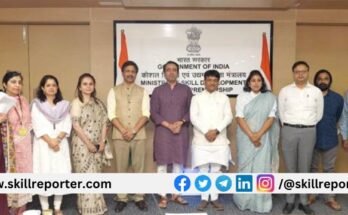UNESCO’s 2015 Recommendation concerning technical and vocational education and training (TVET) states that TVET in all forms and settings should be oriented towards equipping all youth and adults with relevant knowledge, skills and competencies for work and life, and that this should be done through an overall lifelong learning framework. The Recommendation recognizes the crucial role of teaching and training staff in assuring quality and relevance of TVET, and states that ‘policies and frameworks should be developed to ensure qualified and high-quality TVET staff, including teachers, instructors, trainers, tutors, managers, administrators, extension agents, guidance staff and others’.
To this end, the Recommendation asks Member States to build the necessary institutional capacities to ‘ensure the relevance of TVET to current and evolving needs in the world of work, nationally, regionally and internationally, including those implied by the transitions to green occupations, economies and societies’.
UNESCO-UNEVOC is a key component of UNESCO’s international programme on technical and vocational education and training, and supports UNESCO Member States by strengthening partnership, capacity development, and knowledge sharing and development. This is done in collaboration with the UNEVOC Network, a global platform of TVET institutions.
The UNESCO-UNEVOC trends mapping study on ‘The future of TVET teaching’ is the result of a collaborative effort and reflects the contributions of experts from governments, institutions and practitioners, as well as from members of the UNEVOC Network, TVeT Forum and partner institutions.
Coordinated by UNESCO-UNEVOC, trends mapping studies aim to further the international community’s understandings on contemporary key issues concerning TVET. The studies review existing literature and policies, and engage TVET stakeholders from around the world through surveys and virtual conferences.
UNESCO-UNEVOC’s trends mapping study on the future of TVET teaching and learning aimed to engage
the international TVET community to:
(i) improve the understanding of the implications of global disruptions;
(ii) gather knowledge, insights, experiences; and
(iii) highlight promising practices in preparing TVET teaching staff to deliver the skills needed in the 21st century and beyond.
The study was conducted in several phases, including a two-week virtual conference held in October 2019, an online survey open to international TVET community between November 2019 and January 2020, and a peer review process with a panel of TVET experts in April 2020. Experts from UNEVOC centres and partner institutions contributed variously to finalize the study. The members of the UNEVOC TVeT Forum who participated in the virtual conference on the Future of TVET Teaching (7-14 October 2019), contributed their practices and completed the survey.
At the time of writing the final report, the COVID-19 pandemic disrupted everyday lives. It resulted in the closure of education and TVET institutions and influenced the continuation of training. Many institutions quickly switched to online and distance learning modes. However, the preparedness of TVET staff was a major concern. As a global disruption, the COVID-19 pandemic reaffirmed assumptions about the future training needs of TVET staff and to the need to prepare them to use ICT/ digital learning tools, and to teach about entrepreneurial learning and sustainable development, including green economies.
Key outcomes / Ten trends shaping the future of TVET teaching:
Trend 1 – Digitalization has led to growing demand for transversal and applied skills
Trend 2 – Collect and disseminate skills data to plan for future-oriented TVET
Trend 3 – Utilize results of skills assessments to develop in-service and reform preservice training
Trend 4 – Future-focused TVET systems value industry experience and exposure
Trend 5 – Linking in-service training to career progression improves TVET staff’s receptiveness
Trend 6 – High quality in-service training focuses on industry exposure, transversal skills and pedagogy
Trend 7 – Responsive TVET systems train TVET staff on gender responsiveness and inclusive methods
Trend 8 – TVET of future relies on private sector as essential partner
Trend 9 – Effective stakeholder coordination improves quality of TVET staff development
Trend 10 – Engaging TVET staff is vital in aligning TVET systems to the future of work and learning
Content Courtesy : Pooja Gianchandani, UNESCO-UNEVOC International Centre for TVET



